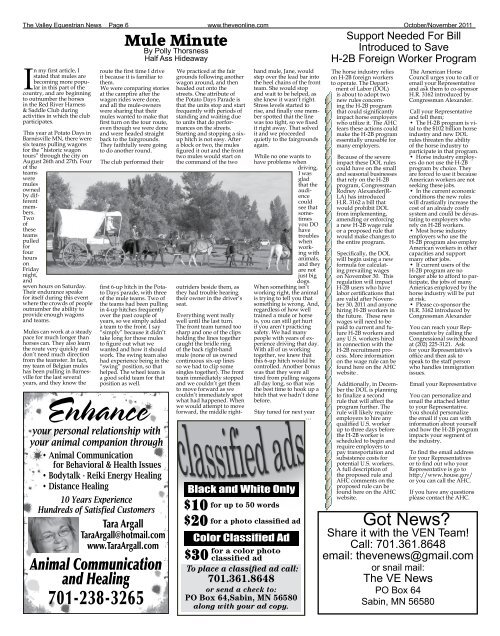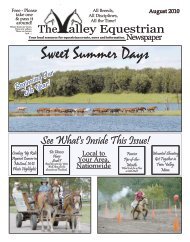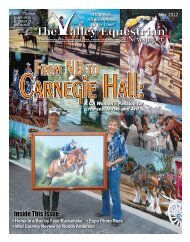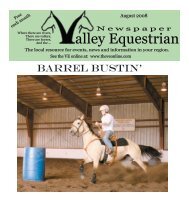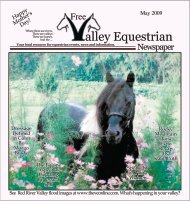October/Nov 2011 - The Valley Equestrian Newspaper
October/Nov 2011 - The Valley Equestrian Newspaper
October/Nov 2011 - The Valley Equestrian Newspaper
Create successful ePaper yourself
Turn your PDF publications into a flip-book with our unique Google optimized e-Paper software.
<strong>The</strong> <strong>Valley</strong> <strong>Equestrian</strong> News Page 6 www.theveonline.com <strong>October</strong>/<strong>Nov</strong>ember <strong>2011</strong><br />
In my first article, I<br />
stated that mules are<br />
becoming more popular<br />
in this part of the<br />
country, and are beginning<br />
to outnumber the horses<br />
in the Red River Harness<br />
& Saddle Club during<br />
activities in which the club<br />
participates.<br />
This year at Potato Days in<br />
Barnesville MN, there were<br />
six teams pulling wagons<br />
for the “historic wagon<br />
tours” through the city on<br />
August 26th and 27th. Four<br />
of the<br />
teams<br />
were<br />
mules<br />
owned<br />
by different<br />
members.<br />
Two<br />
of<br />
these<br />
teams<br />
pulled<br />
for<br />
four<br />
hours<br />
on<br />
Friday<br />
night,<br />
and<br />
seven hours on Saturday.<br />
<strong>The</strong>ir endurance speaks<br />
for itself during this event<br />
where the crowds of people<br />
outnumber the ability to<br />
provide enough wagons<br />
and teams.<br />
Mules can work at a steady<br />
pace for much longer than<br />
horses can. <strong>The</strong>y also learn<br />
the route very quickly and<br />
don’t need much direction<br />
from the teamster. In fact,<br />
my team of Belgian mules<br />
has been pulling in Barnesville<br />
for the last several<br />
years, and they know the<br />
route the first time I drive<br />
it because it is familiar to<br />
them.<br />
We were comparing stories<br />
at the campfire after the<br />
wagon rides were done,<br />
and all the mule-owners<br />
were sharing that their<br />
mules wanted to make that<br />
first turn on the tour route,<br />
even though we were done<br />
and were headed straight<br />
back to the fairgrounds.<br />
<strong>The</strong>y faithfully were going<br />
to do another round.<br />
<strong>The</strong> club performed their<br />
first 6-up hitch in the Potato<br />
Days parade, with three<br />
of the mule teams. Two of<br />
the teams had been pulling<br />
in 4-up hitches frequently<br />
over the past couple of<br />
years, so we simply added<br />
a team to the front. I say<br />
“simply” because it didn’t<br />
take long for those mules<br />
to figure out what we<br />
wanted and how it should<br />
work. <strong>The</strong> swing team also<br />
had experience being in the<br />
“swing” position, so that<br />
helped. <strong>The</strong> wheel team is<br />
a good solid team for that<br />
position as well.<br />
Enhance<br />
your personal relationship with<br />
your animal companion through<br />
• Animal Communication<br />
for Behavioral & Health Issues<br />
• Bodytalk - Reiki Energy Healing<br />
• Distance Healing<br />
10 Years Experience<br />
Hundreds of Satisfied Customers<br />
Tara Argall<br />
TaraArgall@hotmail.com<br />
www.TaraArgall.com<br />
Animal Communication<br />
and Healing<br />
701-238-3265<br />
Mule Minute<br />
By Polly Thorsness<br />
Half Ass Hideaway<br />
We practiced at the fair<br />
grounds following another<br />
wagon around, and then<br />
headed out onto the<br />
streets. One attribute of<br />
the Potato Days Parade is<br />
that the units stop and start<br />
frequently with periods of<br />
standing and waiting due<br />
to units that do performances<br />
on the streets.<br />
Starting and stopping a sixup<br />
hitch is not easy. After<br />
a block or two, the mules<br />
figured it out and the front<br />
two mules would start on<br />
the command of the two<br />
outriders beside them, as<br />
they had trouble hearing<br />
their owner in the driver’s<br />
seat.<br />
Black and White Only<br />
$10<br />
$20<br />
$30<br />
for up to 50 words<br />
Everything went really<br />
well until the last turn.<br />
<strong>The</strong> front team turned too<br />
sharp and one of the clips<br />
holding the lines together<br />
caught the bridle ring<br />
of the back right-hand<br />
mule (none of us owned<br />
continuous six-up lines<br />
so we had to clip some<br />
singles together). <strong>The</strong> front<br />
team immediately stopped<br />
and we couldn’t get them<br />
to move forward as we<br />
couldn’t immediately spot<br />
what had happened. When<br />
we would attempt to move<br />
forward, the middle righthand<br />
mule, Jane, would<br />
step over the lead bar into<br />
the heel chains of the front<br />
team. She would stop<br />
and wait to be helped, as<br />
she knew it wasn’t right.<br />
Stress levels started to<br />
rise, and finally one member<br />
spotted that the line<br />
was too tight, so we fixed<br />
it right away. That solved<br />
it and we proceeded<br />
quietly to the fairgrounds<br />
again.<br />
While no one wants to<br />
have problems when<br />
driving,<br />
I was<br />
glad<br />
that the<br />
audience<br />
could<br />
see that<br />
sometimes<br />
you DO<br />
have<br />
troubles<br />
when<br />
working<br />
with<br />
animals,<br />
and they<br />
are not<br />
just big<br />
dogs.<br />
When something isn’t<br />
working right, the animal<br />
is trying to tell you that<br />
something is wrong. And,<br />
regardless of how well<br />
trained a mule or horse<br />
is, you can still get hurt<br />
if you aren’t practicing<br />
safety. We had many<br />
people with years of experience<br />
driving that day.<br />
With all of us working<br />
together, we knew that<br />
this 6-up hitch would be<br />
controlled. Another bonus<br />
was that they were all<br />
tired from pulling wagons<br />
all day long, so that was<br />
the best time to hook up a<br />
hitch that we hadn’t done<br />
before.<br />
Stay tuned for next year<br />
…<br />
for a photo classified ad<br />
Color Classified Ad<br />
for a color photo<br />
classified ad<br />
To place a classified ad call:<br />
701.361.8648<br />
or send a check to:<br />
PO Box 64,Sabin, MN 56580<br />
along with your ad copy.<br />
Support Needed For Bill<br />
Introduced to Save<br />
H-2B Foreign Worker Program<br />
<strong>The</strong> horse industry relies<br />
on H-2B foreign workers<br />
to operate. <strong>The</strong> Department<br />
of Labor (DOL)<br />
is about to adopt two<br />
new rules concerning<br />
the H-2B program<br />
that could significantly<br />
impact horse employers<br />
who utilize it. <strong>The</strong> AHC<br />
fears these actions could<br />
make the H-2B program<br />
essentially unusable for<br />
many employers.<br />
Because of the severe<br />
impact these DOL rules<br />
could have on the small<br />
and seasonal businesses<br />
that rely on the H-2B<br />
program, Congressman<br />
Rodney Alexander(R-<br />
LA) has introduced<br />
H.R. 3162 a bill that<br />
would prohibit DOL<br />
from implementing,<br />
amending or enforcing<br />
a new H-2B wage rule<br />
or a proposed rule that<br />
would make changes to<br />
the entire program.<br />
Specifically, the DOL<br />
will begin using a new<br />
formula for calculating<br />
prevailing wages<br />
on <strong>Nov</strong>ember 30. This<br />
regulation will impact<br />
H-2B users who have<br />
labor certifications that<br />
are valid after <strong>Nov</strong>ember<br />
30, <strong>2011</strong> and anyone<br />
hiring H-2B workers in<br />
the future. <strong>The</strong>se new<br />
wages will need to be<br />
paid to current and future<br />
H-2B workers and<br />
any U.S. workers hired<br />
in connection with the<br />
H-2B recruitment process.<br />
More information<br />
on the wage rule can be<br />
found here on the AHC<br />
website .<br />
Additionally, in December<br />
the DOL is planning<br />
to finalize a second<br />
rule that will affect the<br />
program further. <strong>The</strong><br />
rule will likely require<br />
employers to hire any<br />
qualified U.S. worker<br />
up to three days before<br />
the H-2B worker is<br />
scheduled to begin and<br />
require employers to<br />
pay transportation and<br />
subsistence costs for<br />
potential U.S. workers.<br />
A full description of<br />
the proposed rule and<br />
AHC comments on the<br />
proposed rule can be<br />
found here on the AHC<br />
website.<br />
<strong>The</strong> American Horse<br />
Council urges you to call or<br />
email your Representative<br />
and ask them to co-sponsor<br />
H.R. 3162 introduced by<br />
Congressman Alexander.<br />
Call your Representative<br />
and tell them;<br />
• <strong>The</strong> H-2B program is vital<br />
to the $102 billion horse<br />
industry and new DOL<br />
rules threaten the ability<br />
of the horse industry to<br />
participate in that program.<br />
• Horse industry employers<br />
do not use the H-2B<br />
program by choice. <strong>The</strong>y<br />
are forced to use it because<br />
American workers are not<br />
seeking these jobs.<br />
• In the current economic<br />
conditions the new rules<br />
will drastically increase the<br />
cost of an already costly<br />
system and could be devastating<br />
to employers who<br />
rely on H-2B workers.<br />
• Most horse industry<br />
employers who use the<br />
H-2B program also employ<br />
American workers in other<br />
capacities and support<br />
many other jobs.<br />
• If current users of the<br />
H-2B program are no<br />
longer able to afford to participate,<br />
the jobs of many<br />
Americas employed by the<br />
horse industry will be put<br />
at risk.<br />
• Please co-sponsor the<br />
H.R. 3162 introduced by<br />
Congressman Alexander<br />
You can reach your Representative<br />
by calling the<br />
Congressional switchboard<br />
at (202) 225-3121. Ask<br />
for your Representative's<br />
office and then ask to<br />
speak to the staff person<br />
who handles immigration<br />
issues.<br />
Email your Representative<br />
You can personalize and<br />
email the attached letter<br />
to your Representative.<br />
You should personalize<br />
the email if you can with<br />
information about yourself<br />
and how the H-2B program<br />
impacts your segment of<br />
the industry.<br />
To find the email address<br />
for your Representatives<br />
or to find out who your<br />
Representative is go to<br />
http://www.house.gov/<br />
or you can call the AHC.<br />
If you have any questions<br />
please contact the AHC.<br />
Got News?<br />
Share it with the VEN Team!<br />
Call: 701.361.8648<br />
email: thevenews@gmail.com<br />
or snail mail:<br />
<strong>The</strong> VE News<br />
PO Box 64<br />
Sabin, MN 56580<br />
<strong>The</strong> <strong>Valley</strong> <strong>Equestrian</strong> News Page 7 www.theveonline.com <strong>October</strong>/<strong>Nov</strong>ember <strong>2011</strong><br />
This past summer, members<br />
and visitors from the<br />
Windcross Conservancy<br />
ranging in ages from 11 to<br />
65 participated in mounted<br />
archery lessons – learning<br />
to shoot bows and arrows<br />
at a target off the<br />
back of a moving<br />
horse. This new<br />
sport exemplifies<br />
the hunting livelihood<br />
that historic<br />
Plains Indians did<br />
when they shot bows<br />
while riding horses.<br />
Shooting arrows at a<br />
target from a horse<br />
is a different kind of<br />
fun than mounted<br />
gun shooting, but it's<br />
the same principle.<br />
<strong>The</strong> golden age of North<br />
American Indians using<br />
mounted horse archery<br />
lasted about 150 years.<br />
It changed the lives of<br />
pedestrian plains tribes<br />
forever, from the Comanche<br />
on the southern<br />
plains of Texas all the<br />
way up through Northern<br />
Plains tribes and clear into<br />
Canada. Long before they<br />
had been introduced to<br />
the rifle, Indians had been<br />
using the bow and they<br />
developed the method of<br />
shooting it while riding,<br />
which became a way of life<br />
for them. It enabled them<br />
to move faster, strike or<br />
defend against enemies,<br />
and hunt buffalo with great<br />
efficiency.<br />
You may know that the<br />
Equine Activity Liability<br />
Act says that you “ride at<br />
your own risk.” However,<br />
liability protections do not<br />
apply to all causes of risk<br />
and all equine activities. A<br />
written liability release in<br />
any equine related activity<br />
is therefore essential for<br />
liability protection. A properly<br />
written and presented<br />
liability release provides<br />
advantages and protections<br />
not offered by the law.<br />
For example, a release<br />
provides an opportunity to<br />
receive, in writing, confirmation<br />
that the signer<br />
has read, understood, and<br />
agrees to accept the terms<br />
of your limitation liability<br />
policy. This alone may<br />
even deter the signer from<br />
filing a lawsuit.<br />
A successfully written release<br />
includes a variety of<br />
essential elements including,<br />
but not limited to:<br />
Parties: <strong>The</strong> parties to the<br />
release should be carefully<br />
identified.<br />
Signature: <strong>The</strong> signature<br />
line should require the<br />
signer's full name, address,<br />
and phone number. <strong>The</strong><br />
signer should indicate if<br />
they are signing on their<br />
Horse Archery and the Spanish Mustang<br />
Today, Plains Archery is<br />
practiced and preserved<br />
by members of the Plains<br />
Horse Archery Association.<br />
Plains Horse Archery was<br />
developed independently<br />
from outside influences and<br />
other countries that used<br />
archery as a lifestyle in<br />
their past, such as Japan,<br />
Hungary, or Mongolia.<br />
Plains Horse Archery is the<br />
reproduction of America’s<br />
own Plains Indian techniques.<br />
<strong>The</strong> shape of the<br />
bows and arrows as well<br />
as the way in which they<br />
are held are unique to the<br />
Plains Tribes culture.<br />
Horses used for the lessons<br />
could not be just any<br />
horse. <strong>The</strong>y were trained<br />
for mounted archery and<br />
above all, they had to be a<br />
steady and thinking partner<br />
to accommodate what<br />
was happening, especially<br />
for beginners. <strong>The</strong>y had<br />
to move in a straight line<br />
own behalf, or on behalf<br />
of their minor child, ward,<br />
heirs, representatives, and/<br />
or assigns. A minor signed<br />
release is not legally enforceable.<br />
Risks: A description of<br />
some risks inherent in dealing<br />
with or around horses is<br />
recommended to further reaffirm<br />
those risks. <strong>The</strong> list<br />
must clearly indicate that<br />
the risks listed are merely a<br />
sampling and not intended<br />
to be an all-inclusive representation.<br />
Waiver: This section<br />
expressly provides that<br />
the signers, on their own<br />
behalf, and/or on behalf<br />
of others, agree to waive<br />
any legal rights to sue for<br />
claims arising from their<br />
involvement in the equine<br />
related activity.<br />
State's Law: <strong>The</strong> enforceability<br />
of the release<br />
may differ depending on<br />
the applicable state law.<br />
<strong>The</strong>refore, providing which<br />
state's law applies explicitly<br />
in the release prevents a<br />
debate on that issue.<br />
Equine Act: <strong>The</strong> release<br />
must include the WARN-<br />
ING notice exactly as it is<br />
stated in the applicable<br />
while their riders used both<br />
hands to shoot. Riders who<br />
are new to the sport are<br />
too busy figuring out what<br />
to do with the bow and arrow<br />
to stop and guide their<br />
horse, so a steady mount is<br />
imperative.<br />
<strong>The</strong> horses were either<br />
led by another person or<br />
were independently ridden<br />
at a walk straight ahead.<br />
<strong>The</strong> horses knew what they<br />
were doing and did their<br />
job with<br />
a graciousness<br />
that was<br />
much<br />
appreciated<br />
by<br />
beginner<br />
archers.<br />
One<br />
of the<br />
riders<br />
was<br />
Lucia<br />
Roda,<br />
president of Windcross<br />
Conservancy and Program<br />
Director of the Windcross<br />
Preserve in Buffalo Gap,<br />
South Dakota - a preserve<br />
for the endangered Spanish<br />
Mustang horse. Roda<br />
brought her own Indian<br />
horse for the lessons, a<br />
Spanish Mustang named<br />
Thunderhawk. Though it<br />
was the first time he was<br />
Tip-of-the-Month<br />
state’s Equine Activity Liability<br />
Act.<br />
Specifics: Many releases<br />
include provisions specific<br />
to the drafter's needs. For<br />
example, some releases<br />
ask for the<br />
rider's prior<br />
riding experience,<br />
authorization<br />
for medical<br />
attention,<br />
agreement<br />
to wear a<br />
certified<br />
helmet, and<br />
the rider's<br />
insurance<br />
information.<br />
Use the<br />
information<br />
provided<br />
here to limit<br />
your liability<br />
from the inherent<br />
risks<br />
of equine related<br />
activities.<br />
Spend<br />
the time<br />
and money<br />
now on an<br />
effective<br />
and enforceable<br />
release<br />
so you can<br />
stay out of<br />
ever used for mounted<br />
archery, Roda was much<br />
more comfortable on him<br />
than the lesson horses,<br />
which were very well<br />
trained. “I trust him not to<br />
hurt me, so off we went!”<br />
she remarked. “It was<br />
the most fun I have<br />
had in quite a while!”<br />
It's not unusual that<br />
a Spanish Mustang<br />
would take naturally<br />
to a rider shooting<br />
from its<br />
back.<br />
Spanish<br />
Horses<br />
were<br />
the first<br />
horses<br />
used for<br />
mounted<br />
archery<br />
in<br />
North America and<br />
this was evident as<br />
early as the 1600's.<br />
(Reference: the<br />
"Codex Baranda"<br />
and the Segesser<br />
hide, 1681.)<br />
It began when<br />
some of the Spanish<br />
horses from<br />
breeding farms in<br />
Mexico ended up<br />
court and out with your<br />
horse. Now that you know<br />
the state law is not enough<br />
liability protection, GET IT<br />
IN WRITING!<br />
with North American tribes<br />
who developed their own<br />
method of using them to<br />
hunt and shoot predators.<br />
Spanish-descended horses<br />
from the Plains were so<br />
good that when the U.S.<br />
This tip was brought to you<br />
by Yvonne C. Ocrant, Esq.<br />
and KAM Animal Services<br />
and KAM’s Equine Learning<br />
Circle which hosts<br />
FREE webinars every<br />
Cavalry fought Indians,<br />
they either killed the Indians’<br />
horses or collected<br />
hundreds of Spanish Mustangs<br />
for their own soldiers<br />
because American bred<br />
horses were no match.<br />
Today's Spanish Mustangs<br />
retain the same enduring<br />
traits and remain vastly different<br />
in both appearance<br />
and ancestry from other<br />
American breeds as well as<br />
other feral Plains horses.<br />
(Reference: <strong>The</strong> American<br />
Indian Horse and the Spanish<br />
Mustang chapters of<br />
<strong>The</strong> Official Horse Breeds<br />
Standards Guide book.)<br />
Roda commented about<br />
the horse archery lessons,<br />
“All in all, it was a blast and<br />
I can't wait to do it again!”<br />
<strong>The</strong> instructor for the lessons<br />
was a competent man<br />
named Jay Red Hawk.<br />
He was so impressed with<br />
Roda’s horse that he now<br />
has a Spanish Mustang<br />
and has become fascinated<br />
with the breed. You can<br />
check out his comments<br />
about Horse Archery on his<br />
Facebook.<br />
Fran Lynghaug<br />
with Lucia Roda, Windcross<br />
Conservancy, Inc., a<br />
South Dakota 501c3<br />
windcross@mac.com<br />
No Degree requireD!<br />
Have some extra time?<br />
Like to talk horses?<br />
Want to help people promote<br />
their business?<br />
You’re a perfect candidate for<br />
regional sales manager!<br />
Phone and computer required.<br />
Call: 701.361.8648 or<br />
email: leybou@gmail.com<br />
month. Just go to www.<br />
kamanimalservices.com to<br />
sign up.


